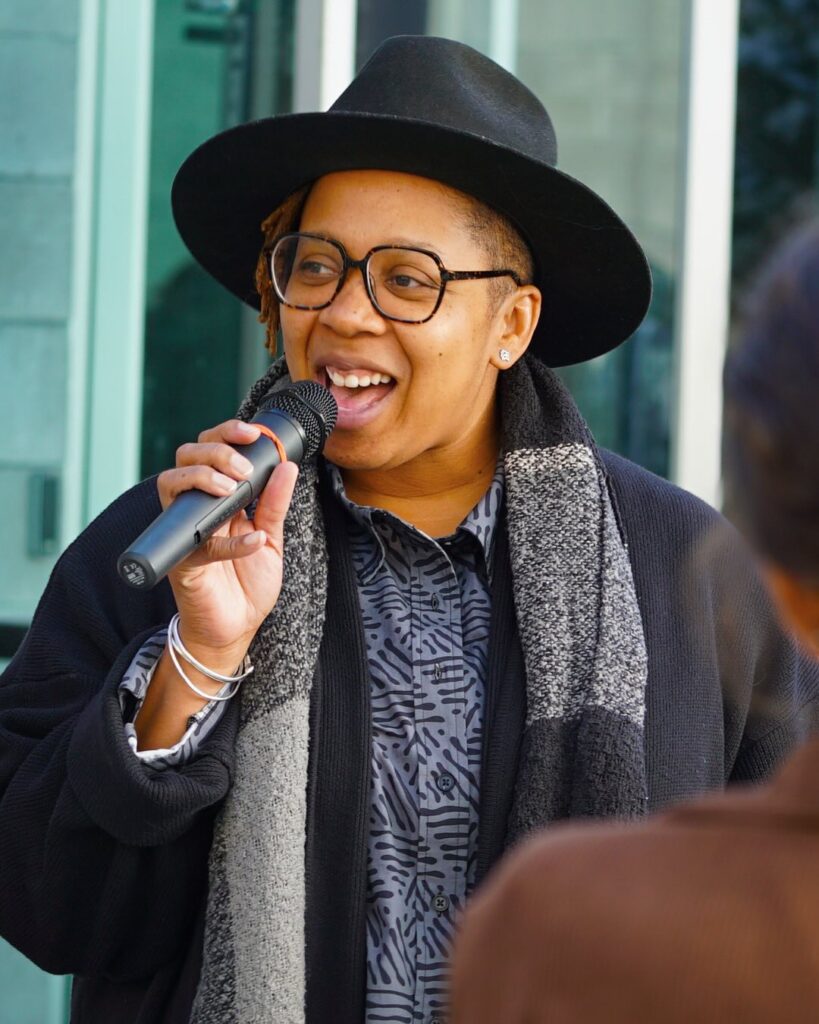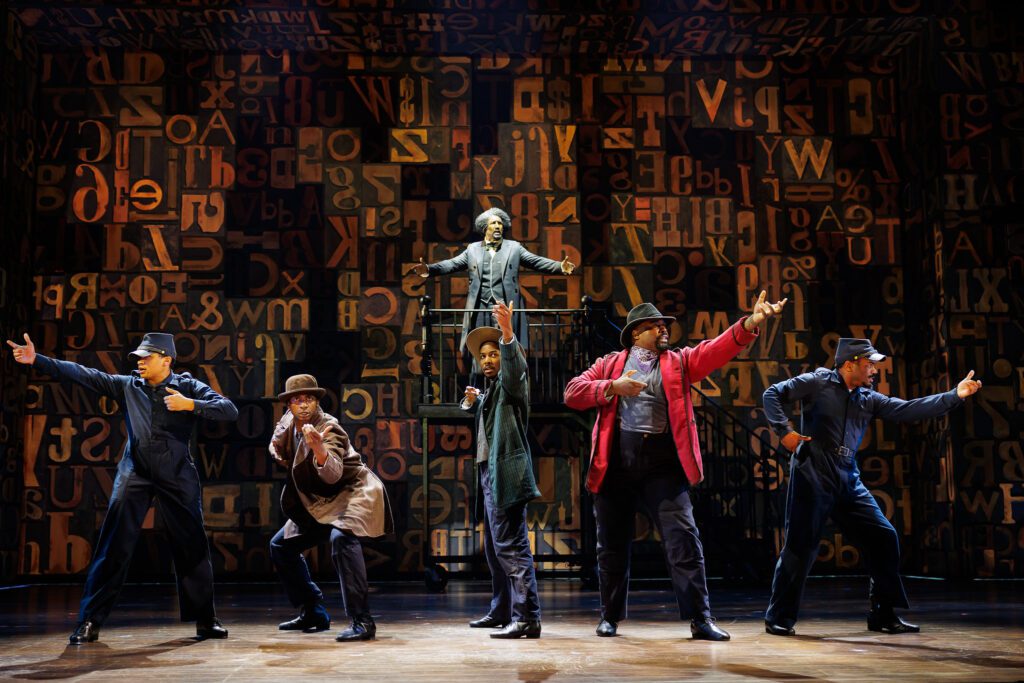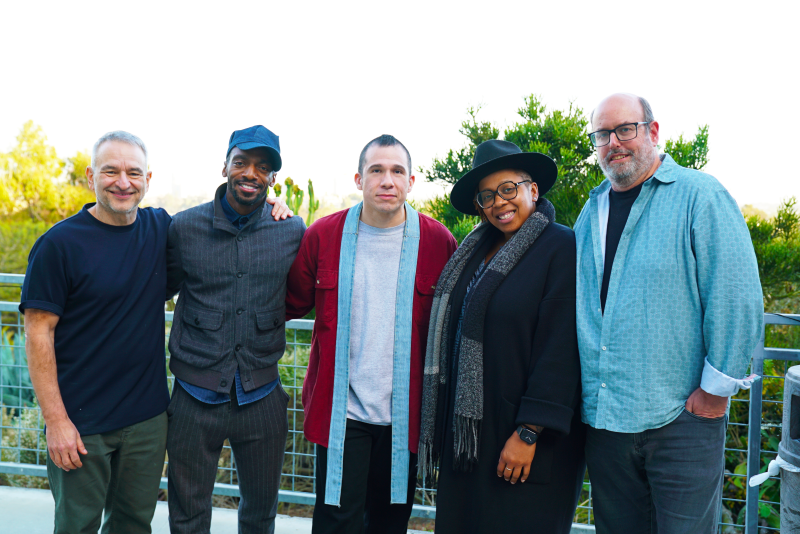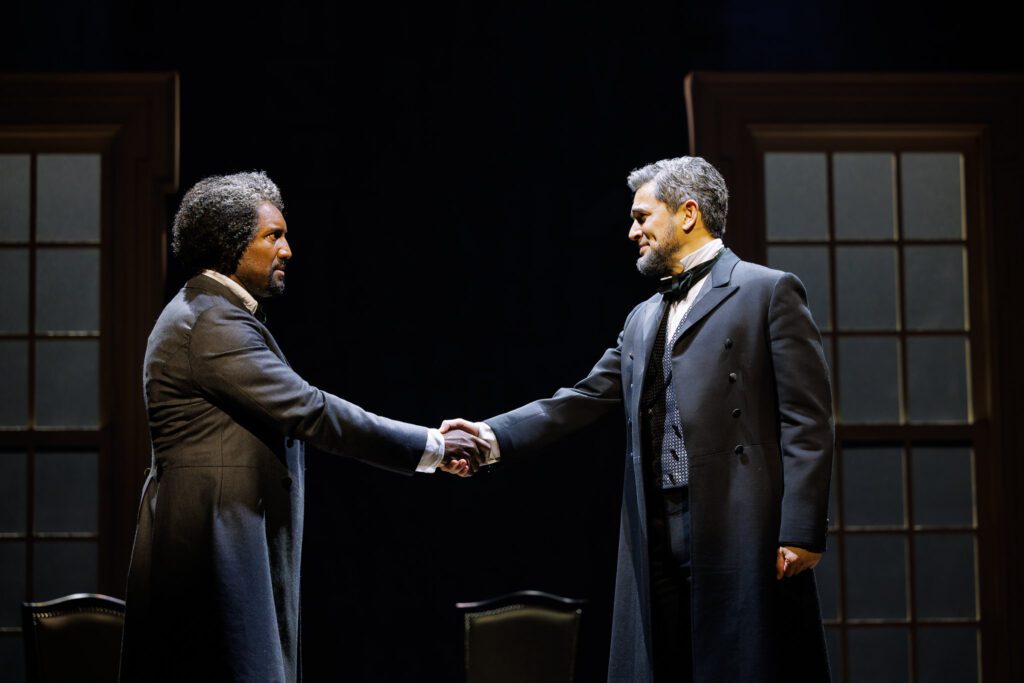
With powerful lyrics, hard hitting melodies and soul-stirring percussions that’ll have your heart pounding—“3 Summers of Lincoln” is the newest masterpiece to hit La Jolla Playhouse. The world-premiere musical opens Tuesday, February 18, and the show follows one of the most important friendships in our nation’s history—Abraham Lincoln and Frederick Douglass. In the middle of a divided country coming together, the two brilliant leaders met for three pivotal conversations that shaped the course of our history. We can’t wait to see it, and we were lucky enough to have a conversation with one of the members of the multi-award-winning creative team. So, on a rainy Sunday afternoon, we settled in, got cozy and chatted on Zoom with the incredibly talented and very down to earth composer of the show, Crystal Monee Hall.
The Journey to 3 Summers of Lincoln
Crystal came to the project through her “brother” Daniel J. Watts, the show’s co-lyricist and choreographer. Daniel, who had worked with book writer Joe DiPietro on Memphis, brought her into the fold, as the missing piece of the creative puzzle. From there, she took existing lyrics and transformed them into something that speaks to both the past and present. Crystal’s eyes lit up as she joked that rather than starting where most composers normally would, she began composing the opening number first. Although it didn’t become the opening number in the final version of the show, the song “90-Day War”is in one of the most powerful scenes— where Abraham Lincoln and Frederick Douglass meet for the first time. Rich in string guitar and percussion, the song isn’t just about war on the battlefield but Crystal’s score carries the emotional and social weight felt by everyone impacted—including children, families, nurses, mothers, and the First Lady herself.
The Sound of 3 Summers of Lincoln
So, what exactly does Abraham Lincoln sound like? Together we all burst into laughter when Crystal joked about the initial head-scratching question presented to her. But, when she realized that the project wasn’t just about Lincoln himself—and that it was about Lincoln meeting Frederick Douglass, her eyes lit up, “That,” she chuckled, “I could do!”
And she definitely did. Drawing from her roots as a Southern church girl, she loved watching her mom sing in the choir on Sunday mornings. Fun fact: she’s born on her mom’s birthday! Crystal’s creative approach to the show was deeply personal, having infused the score with early art forms of American foundational music. Sounds that are steeped in African rhythms, gospel, spirituals, work songs, and a percussive heartbeat—all of which are fundamentally Black American. “There’s something that happens when you hear gospel music,” Crystal passionately expressed, “There’s an ancestral connection and reason why our people dance, praise and chant.” 3 Summers of Lincoln reflects the sonic identity of America, blending in jazz and its descendants—rock and hip-hop, all of which lend themselves to the military sound of drums. It sounds like home, but it’s also fresh—both nostalgic and revolutionary. Crystal reminded us, grinning with a playful smirk, “It’s not ya mama’s Lincoln!” And we like that!

From Choir Girl to Composer
What’s beautiful about Crystal’s journey is how she’s always known her path, “I’ve been singing since I was a child,” she reflected as her eyes lit up, “But I knew early on that I wanted to direct the songs.” Having always been moved by film scores, Crystal was naturally drawn to the power of sonic storytelling—the way that a score can shape an audience’s emotions without them even realizing it. In 3rd grade, she moved to a county where there were no sidewalks and coincidently no Black people. But, she warmly chuckled at the experience because it introduced her to one of her first experiences in musical theatre, securing a role in Oliver! It was there that her creative path only became clearer—performing was great, but she wanted to create the stories herself.
Drawing personal inspiration from Stevie Wonder, Earth, Wind & Fire and Ohio Players, she’s also influenced by Duke Ellington, Sister Rosetta Tharpe, and Robert Johnson to name a few. In musical theatre, she loves Stephen Sondheim’s storytelling as well as contemporary works and song cycles like Songs for a New World. Actually, during the pandemic, she performed a song called Love Power from a 1970s song cycle by the trailblazing Black female composer Micki Grant. The show is called Don’t Bother Me, I Can’t Cope, and is historical, as Micki is the first woman to write the book, music, and lyrics for a Broadway musical—a fact that we only learned after this interview!
Collaboration & Creative Process
For Crystal, the creative evolution of 3 Summers of Lincoln has been nothing short of magical and she describes the experience with a sparkling awe in her eyes, “When you look at the ocean and feel small, or when you look at the stars in the sky—that’s how I feel every single day, seeing this massive machine.” She described the collaborative process with Joe DiPietro and Daniel J. Watts as a beautiful synergy. With Joe as the fearless leader, the team abided by a single guiding principle, the story always wins. She’d created the music, and the four members of the creative team would meet in their small enclave, but once the music entered rehearsals, she had to relinquish control—a humbling process. “You get in a room, and it’s your job to keep writing, but someone else’s job to teach your music. You sit on your hands and let them do their job.” Seeing the production evolve from intimate readings with music stands to a full-fledged theatrical experience with crew, costumes, scenic design, choreography, lighting, the stage management and music team was surreal. That’s a part of the beautiful and anxious journey of an artist seeing their vision come to life.

What 3 Summers of Lincoln Asks of Its Audience
Eerily, some scenes in the show mirror real-life events that are currently happening in 2025, and Crystal hopes that this underscores the urgency of the moment—the need for collective action. The story juxtaposes Lincoln, a methodical lawyer, with Douglass, an impassioned activist and their dynamic serves as a reminder that change requires both strategy and urgency. She hopes audience members leave feeling empowered to take action in their own ways—whether that means writing to elected officials, raising socially conscious children, creating art, or simply staying engaged in their communities. “We’ve come so far, but things haven’t changed that much,” she noted, “I want everyone to leave knowing that there’s a country better than the one we live in—and they can help build it.” Crystal believes that everyone has a role in shaping America’s future and it’s important that people walk away from this show knowing that they can do more than just spectate.
3 Summers of Lincoln is sure to be a musical experience that isn’t just a history lesson set to masterful composition and bold new sounds—it carries a hope that it’ll invoke something in audiences. By inviting people to learn from the past, how Frederick Douglass and Abraham Lincoln worked together, the show sparks a call to action—encouraging audiences to examine their own role in creating a better country for the future. The score moves with a familiarity, mirroring how the show itself connects our past to this very moment. And if that’s not revolutionary, we don’t know what is.
Extended by popular demand, 3 Summers of Lincoln begins February 18th — get your tickets today and we’ll see you there. And Crystal—we see you, we’re rooting for you, and we’re ready for whatever you create next!

‘Click here to purchase tickets to 3 Summers of Lincoln’
Where: Mandell Weiss Theatre, La Jolla Playhouse, 2910 La Jolla Village Drive, La Jolla
When: Feb 18 through March 30.
In a joint effort, Gwen Pierce & Shanda Pierce interviewed Crystal Monee Hall and contributed to this article.
